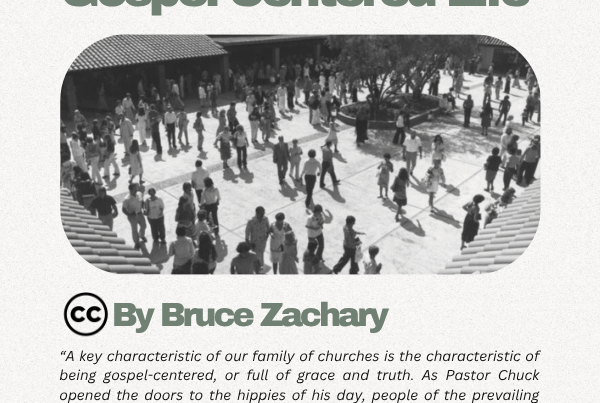
“The Word became flesh and dwelt among us, and we beheld His glory, the glory as of the only begotten of the Father, full of grace and truth … And of His fullness we have all received, and grace for grace” (John 1:14 & 16).
The world had never seen anyone like Jesus.
John certainly read the first three gospels, all written in similar style. Matthew, Mark and Luke reported many of the same miracles, messages and encounters Jesus had with desperate souls and dangerous, self-righteous, religious leaders. However when John writes he chooses a very different style. Rather than a fourth “synoptic,” John reaches far earlier than Jesus’ earthly arrival in Bethlehem to begin. He takes us back to “The beginning.”
John also tells us our creator was literally and physically here among us. Not a representative, ambassador or apparition of God. This was God Himself. In a very matter-of-fact manner, John introduces the greatest mystery of all; God was, at the same precise moment, both above in heaven, and below, on earth. He doesn’t try to explain how this was possible. He just places that truth front and center for us to behold as we look over his shoulder at the Son of God whom we will be told is “the express image” of God. Jesus Himself would tell Philip, “If you’ve seen Me you have seen the Father.”
John fills His gospel biography of Jesus with direct statements and convincing proof that this was not just “another Jewish male” but a one-of-a-kind. He was truly man, yet truly God.
Here in the beginning, John summarizes the life of this Jesus with words that had never been true of any other man or woman. We are told that John and His friends “beheld the glory of the Father” in Jesus. Then John goes on to describe that glory. In that description you would expect words like “we saw miracles and wonders,” or “We saw Him glow in the dark.” John saved those stories for later in the narrative. Here, to define this “Fatherly glory,” he simply says this Word who became flesh, was “full of grace and truth.”
That’s it? That’s the definition of glory? Let’s not rush past that concise description of glory.
Jesus was not just “gracious and truthful.” Many people could be described that way. Jesus was full of grace and truth.
There it is; yet another mystery. How can someone be full of two things? Common sense tells us we can have either equal amounts or varying degrees of certain substances, but you can’t be “full” of two different substances. And yet, here was Jesus so full of both that He was constantly spilling both grace and truth on all those He encountered.
Jesus was filled with grace, and not just the “doctrines of grace.”
He was relationally gracious with men and women who deserved judgment. He granted pardons to harlots, executioners, betrayers, deniers and thieves on crosses. That’s grace.
Jesus was also full of truth. Again, this is not just theological truth, though He could have clarified the meaning of the Scriptures like no one ever had or ever will. Jesus spoke courageously and honestly to wayward souls about the danger of staying on the wrong paths where He had found them. He spoke truth that challenged the hypocrite as well as the con artist. Jesus had the most perfectly balanced ministry the world has ever witnessed.
In the early days of ministry, I leaned heavy toward seeking “fullness of truth” and was well on my way to being a solid Pharisee, with answers for Bible questions and clear judgment for every moral compromise. What I lacked in great measure was grace.
Grace without truth fosters moral confusion and invites us to see God as a “good old boy” who will never tell us to “straighten up.” Truth without grace can breed, among other maladies, cold, joyless legalism.
When I was 16, I asked a clergyman why my 17-year-old brother had just died. He told me it was because my mom had divorced my dad. Oddly, I think I understand his logic (his “truth”), but there was not a milligram of grace either in the form of a trembling voice or shared tear for a crushed and grieving soul. I left the church that day and ran like a fugitive from the “Hound of Heaven” for over two years. Then one autumn afternoon, I encountered a young “Jesus Freak” who spoke truth to me with compassion. They cared. That changed everything. My defenses crumbled.
Jesus wasn’t tilted to one side or the other.
When John says, “Of His fullness we have all received, and grace for grace,” he’s reminding us that the salvation and healing we have received is due to the perfect fullness of grace and truth we have received from our glorious Father. Put another way, only grace provides the power to live in the truth.
We live in the age of metrics where numbers tell all. The significance of a business is measured by the dollars. The worth of a student is measured by their SAT scores. The success of churches is measured by attendance records, offerings, the size of a staff and location of their real estate. But not all that matters can be measured with yardsticks.
It’s wonderful to see churches grow in attendance. It’s helpful when they grow in financial and human resources. But it’s most significant and truly remarkable when the tribes we lead grow in grace and truth, for as the measure of these commodities increase in our fellowships, we are not merely climbing to the top of an imposed metric of measurement to justify our existence. We are reflecting the very heart and character of our God who walked among us in the perfect balance of absolute love and an unswerving standard of truth.
The world had never seen anyone like Jesus.
May they see Him again today in the tangible overflow of His grace and truth from our hearts to theirs.









